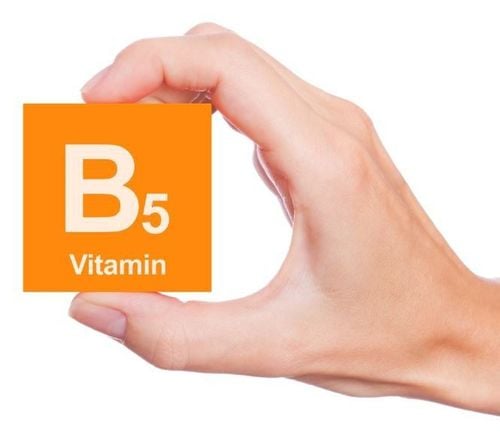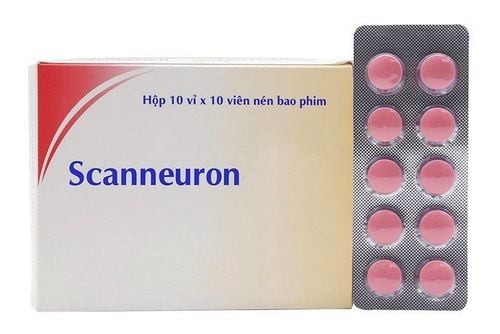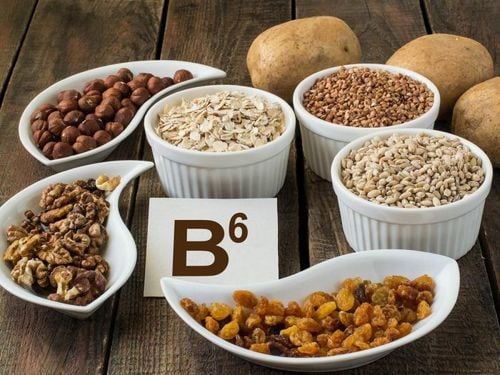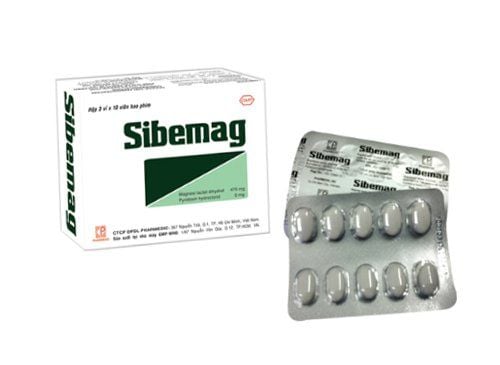This is an automatically translated article.
Vitamin B6 also known as pyridoxine is one of the eight B vitamins. Vitamin B6 deficiency is quite common in people with liver, kidney, digestive or autoimmune diseases, as well as smokers and obese people. , alcoholics and pregnant women. Here are 9 signs and symptoms of vitamin B6 deficiency.1. Skin rash is a symptom of vitamin B6 deficiency
Vitamin B6 deficiency is one of the causes of a red, itchy rash known as seborrheic dermatitis. The rash may appear on the scalp, face, neck, and chest. It is known for its greasy, flaky appearance and can cause swollen or white patches. One reason B6 deficiency can lead to skin rashes is because the vitamin helps synthesize collagen, which is essential for healthy skin.In these cases, consuming B6 can help get rid of the rash quickly. Some people with seborrheic dermatitis may need a higher B6 intake for others. Face creams containing B6 may be helpful in improving symptoms caused by seborrheic dermatitis.
2. Cracked and painful lips due to vitamin B6 deficiency
Dry cracked lips is characterized by sore lips, cracked corners of the mouth, redness and swelling with B6 deficiency. The cracked area can bleed and become infected. In addition to being very painful, chapped and sore lips can make activities like eating and talking difficult. This condition can be improved by determining if the cause is B6 deficiency and if that is the cause, vitamin-rich foods should be added. Notably, deficiencies in riboflavin, folate, iron, and other nutrients can also cause this condition.
Khô nứt môi được đặc trưng bởi đau môi, khóe miệng nứt, đỏ và sưng với do thiếu B6
3. Pain and gloss of the tongue are symptoms of vitamin B6 deficiency
If B6 is deficient, the tongue may become swollen, painful, inflamed, or red. This is called glossitis. Manifestations of inflammation are the glossy, smooth surface of the tongue, the appearance of bumps on the tongue. Glossitis can cause problems with chewing, swallowing, and talking. If glossitis is caused by a B6 deficiency, then a B6 supplement can treat the condition. Deficiencies in other nutrients, including folate and B12, can also lead to glossitis. After getting enough of all the missing vitamins, you may need to clear up glossitis.4. Mood swings
A B6 deficiency can affect mood, sometimes contributing to depression, anxiety, irritability, and increased feelings of pain. This is because B6 is involved in making certain neurotransmitters, such as serotonin and gamma-aminobutyric acid (GABA). Both serotonin and GABA help control anxiety, depression, and feelings of pain. The role of B6 in combating mood problems is being tested under a variety of conditions. For example, in about half of people with autism taking a B6 supplement reduces behavioral problems, possibly because it helps make neurotransmitters.Research also shows that taking 50-80mg of B6 daily can help reduce symptoms of premenstrual syndrome (PMS), such as moodiness, irritability, anxiety, and depression. The reason B6 can help with PMS is because it helps create serotonin, which improves mood. Scientists are doing more research to find out if women experiencing PMS really have vitamin and mineral deficiencies.

Có nghiên cứu đã chỉ ra rằng uống 50-80mg B6 mỗi ngày có thể giúp giảm triệu chứng của hội chứng tiền kinh nguyệt như buồn rầu, khó chịu,...
5. Weakened Immune Function
A well-functioning immune system is key to preventing infection, inflammation, and various cancers. Deficiencies of nutrients, including B6, can disrupt the immune system. More specifically, a B6 deficiency can lead to a decrease in the production of antibodies needed to fight infections.A B6 deficiency can also decrease the body's rate of production of white blood cells, including T cells. These cells regulate immune function, helping it to respond appropriately. In addition, B6 helps the body make a protein called interleukin-2, which helps direct the action of white blood cells. People with autoimmune disorders (in which the immune system fights itself), may have increased destruction of B6, increasing the need for the vitamin.
6. Fatigue and low energy
Vitamin B6 deficiency can make you feel tired and lethargic. Because vitamin B6 helps to make hemoglobin. It's the protein in red blood cells that helps carry oxygen around the body. If the cells don't get enough oxygen due to too little hemoglobin, it is anemia. That can make the body feel tired and weak.There are cases of anemia associated with B6 but using the form of pyridoxine hydrochloride (HCl) has not been effective. However, supplementation with the most active form of B6 called pyridoxal 5 W-phosphate (PLP) resolved this anemia.
You can buy B6 in either form as a supplement, but pyridoxine HCl is more common and usually costs less than PLP. Besides feeling fatigued from anemia, a B6 deficiency can also contribute to fatigue due to its role in making the sleep-promoting hormone melatonin.

Thiếu vitamin B6 có thể khiến bạn cảm thấy mệt mỏi và uể oải
7. Tingling and pain in hands and feet
B6 deficiency can cause nerve damage known as peripheral neuropathy. Symptoms may include burning and stabbing pain in the hands and feet. It feels like pins and needles. Nerve damage can also lead to difficulty with balance and walking. Additionally, repeatedly taking too much of the inactive form of B6 (pyridoxine HCl) from supplements can also cause neuropathy. This happens because large amounts of inactive B6 can compete with and block the active form of PL6 in the body. Nerve problems caused by B6 deficiency are reversible with adequate B6 intake. However, nerve problems from B6 toxicity can be more difficult to treat.8. Seizures
Seizures occur for various reasons, which include B6 deficiency. Without enough B6, the body can't make enough of the calming neurotransmitter GABA, so the brain can become overstimulated. Seizures can cause symptoms such as muscle spasms, eye roll and arm or leg twitching, rapid, uncontrollable tremors, or loss of consciousness.B6 deficiency can cause seizures in infants. The first cases were recorded in the 1950s in infants fed infant formula with insufficient B6. More recently, seizures due to B6 deficiency have been reported in adults as well. These cases are most commonly found in pregnancy, alcohol abuse, or drug interactions or liver disease. B6 supplementation has been shown to be very successful in the treatment of related seizures.

Thiếu B6 có thể gây co giật ở trẻ sơ sinh
9. High Homocysteine
Homocysteine is a by-product created during protein digestion. A deficiency of B6, as well as folate and B12, can lead to abnormally high blood levels of homocysteine, as these B vitamins are needed to help process homocysteine. Increased homocysteine levels have been linked to a number of health problems, most notably heart disease, stroke, as well as Alzheimer's disease. When homocysteine is elevated, it can damage blood vessels and nerves. Fortunately, homocysteine levels can be checked with a simple blood test. Increased homocysteine can be lowered by supplementing with B6, B12 and folate. It should be noted that other factors, such as eating habits and physical activity, are also associated with diseases associated with high homocysteine.10. Foods rich in vitamin B6
The body cannot store much B6. To avoid shortage, we need to supply it on a regular basis. This is usually not difficult to do, as B6 is widely found in many animal and plant foods. In addition, it is often added to fortified foods such as breakfast cereals and nutrients. The recommended daily intake (RDI) for vitamin B6 for non-pregnant adults is 1.7 mg.Here are some top foods that provide natural B6:
| Thực phẩm | Kích cỡ | % RDI |
| Ức gà không da, rang | 85 g | 40% |
| Thịt lợn thăn, rang | 85 g | 33% |
| Cá bơn, nấu chín | 85 g | 32% |
| Sirloin bít tết, nướng | 85 g | 29% |
| Ức gà không da, nấu chín | 85 g | 26% |
| Cá hồi coho hoang dã, nấu chín | 85 g | 24% |
| Chuối | 118 g | 22% |
| Khoai tây nướng với da | 138 g | 21% |
| Hạt hồ trăn rang | 28 g | 19% |
| Ớt đỏ ngọt, sống | 92 g | 16% |
| Mận khô | 33 g | 14% |
| Rau mầm Brussels đông lạnh, luộc | 78 g | 13% |
| Hạt hướng dương, rang | 28 g | 11% |
| Quả Bơ | 68 g | 11% |
| Đậu lăng, luộc | 99 g | 10% |
In the body, Vitamin B6 is involved in more than 150 enzymatic reactions. These reactions help the body process protein, carbs, and fat after eating. B6 is also closely linked to the functions of the nervous and immune systems. Recently, it has been discovered that B6 has antioxidant and anti-inflammatory properties. This means it may play a role in helping to prevent chronic diseases like heart disease and cancer.
Possible signs and symptoms of B6 deficiency include skin rash, cracked lips, glossy tongue, mood swings, impaired immune function, fatigue, neuralgia, seizures, and elevated levels homocysteine. If you are concerned you may not be getting enough B6 or may be deficient, talk to your doctor to determine the best direction of supplementation.
B6 deficiency is generally easy to avoid as long as you have healthy eating habits that include a variety of fruits, vegetables, nuts, meat and fish. In some cases, vitamin B6 supplements may also be recommended.
Vinmec International General Hospital with a system of modern facilities, medical equipment and a team of experts and doctors with many years of experience in medical examination and treatment, patients can rest assured to visit. examination and treatment at the Hospital.
Please dial HOTLINE for more information or register for an appointment HERE. Download MyVinmec app to make appointments faster and to manage your bookings easily.
Reference source: healthline.comLEARN MORE
Harm of vitamin B6 excess or deficiency Harm of vitamin A excess or deficiency Signs that a child is vitamin D deficient













